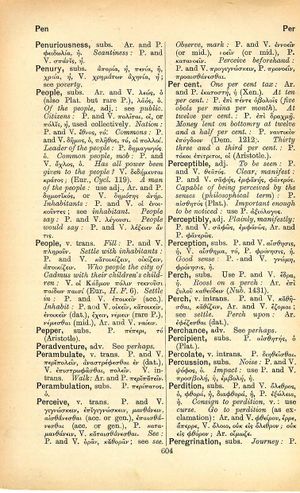per cent: Difference between revisions
From LSJ
χρώμεθα γὰρ πολιτείᾳ οὐ ζηλούσῃ τοὺς τῶν πέλας νόμους → we live under a form of government which does not emulate the institutions of our neighbours
(CSV4) |
m (Text replacement - "<b class="b2">P</b>," to "P.") |
||
| Line 4: | Line 4: | ||
<b class="b2">At twelve per cent.</b>: P. ἐπὶ δραχμῇ. | <b class="b2">At twelve per cent.</b>: P. ἐπὶ δραχμῇ. | ||
<b class="b2">Money lent on bottomry at twelve and a half per cent.</b>: P. ναυτικὸν ἐπόγδοον (Dem. 1212). | <b class="b2">Money lent on bottomry at twelve and a half per cent.</b>: P. ναυτικὸν ἐπόγδοον (Dem. 1212). | ||
<b class="b2">Thirty three and a third per cent.</b>: | <b class="b2">Thirty three and a third per cent.</b>: P. τόκοι ἐπίτριτοι, οἱ (Aristotle). | ||
}} | }} | ||
Revision as of 15:28, 6 November 2019
English > Greek (Woodhouse)
One per cent tax: Ar. and P. ἑκατοστή, ἡ (Xen.).
At ten per cent.: P. ἐπὶ πέντε ὀβολοῖς (five obols per mina per month). At twelve per cent.: P. ἐπὶ δραχμῇ. Money lent on bottomry at twelve and a half per cent.: P. ναυτικὸν ἐπόγδοον (Dem. 1212). Thirty three and a third per cent.: P. τόκοι ἐπίτριτοι, οἱ (Aristotle).

